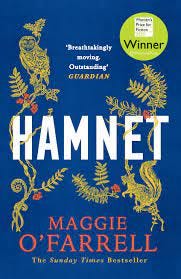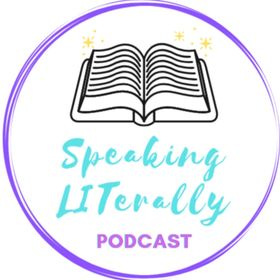BOOK REVIEW: Hamnet by Maggie O'Farrell
A powerful and emotional view of life and loss through the eyes of the famous playwright's wife.
I am dead: Thou livest; . . . draw thy breath in pain, To tell my story Hamlet, Act V, scene ii
I had this one for a while sitting on my shelf, but I wasn’t in a major rush to read it. I’m not a huge fan of historical fiction or period books, but as an English teacher who taught multiple different Shakespearean plays including Hamlet, I knew at some point I’d get around to it. And, here we are. It was part of my 12 books in 12 months and I was determined to ‘get it over with.’
I’ve heard people rave about this book, and I can see why, but that’s not me. I enjoyed the book and am glad that I read it, but it was just another historical fiction novel at the end of the day.
I loved Agnes and that she was the focus of this book. The dueling timelines allows the reader to see Agnes from her youth through her marriage to Shakespeare as well as what would be considered the present time in which the story was moving chronologically from. The timelines would switch back and forth until the past timeline collided with the present - Hamnet’s death. Not a spoiler! Everyone should know the basics of Shakespeare’s life.
Agnes’s character is wonderful. She’s strong and fierce, eccentric and bold. She breaks the mold of expectations set for women in the 1500s. Having her family interactions and seeing her challenges to get to where she is by the end are inspiring at times. Matched with Shakespeare’s own experiences growing up and family dynamics all adds to the empathy you feel for them. It makes you root for them. It also frustrates you when you see how Shakespeare can just up and leave to London for months on end and what that does to Agnes.
She, like all mothers, constantly casts out her thoughts, like fishing lines, towards her children, reminding herself of where they are, what they are doing, how they fare. From habit, while she sits there near the fireplace, some part of her mind is tabulating them and their whereabouts…
The writing is beautiful. It is elegant and matches the tone that you would expect from a book about Shakespeare’s era. There were flowering descriptions and an eloquence to how scenes fit together. However, there were some descriptive scenes (the plague flea’s travel adventure) that literally began to make me squirm. But, I loved how that description was mirrored in the description of the Your-Child-Is-Dying letter’s trip to London. I’m still struggling to get that flea out of my head!
What I was absolutely annoyed by was that William Shakespeare was never, ever addressed by name. I understand that the book is about Agnes not William. But, EVERYONE knows that it’s William Shakespeare even without mentioning his name! He was simply referred to as the tutor, father, husband, son. I don’t know why it irritated me, it just did. Others loved this aspect of his anonymity, so I know it’s a personal preference, but still…
There is so much that broke my heart. Even the experiences she had with birthing her children. Her need and strength to do it on her terms, but to have no control over what is expected and allowed and proper being slapped across her face. But, the tragedy of Hamnet’s death at just 11 years. How Agnes’s grief was portrayed was heart wrenching and tear jerking. As a parent, the thought of losing one of my children is unimaginable. The debilitating depression and helplessness was palpable, as was how those around her treated her in response.
How do you as a mother cope with the death of a child while also trying to help that child’s twin understand how to continue on and live with a piece of themselves missing. The scenes are dripping with emotion and imagery, which is beautiful even though it’s devastating.
What is the word, Judith asks her mother, for someone who was a twin but is no longer a twin?
During this time, the name Hamnet was interchangeable with Hamlet. Clearly, Shakespeare’s play Hamlet was well read across generations and throughout the world. To know that this play was written following his son’s death isn’t a secret; however when you place that knowledge beside the power and force of this book, there is a deeper emotion. I couldn’t have asked more a more moving conclusion than what O’Farrell gave.
Where does this book land on my bookshelf?
It’s another middle shelfer; however, it is probably higher up than any other historical fiction books I’ve read. I’m sure this may be an unpopular opinion, but it’s more that it is just not my preferred genre. I absolutely loved Agnes and I applaud her for what she was able to overcome from her husband's extracurriculars to her child’s death, and that doesn’t even include the difficulties she endured in her youth under that selfish and jealous hand of her step-mother. I am glad I read this book, and if you are intrigued by Shakespeare’s life (clearly fictionalized to a degree) and/or a fan of historical fiction, I do highly recommend reading this one. Granted, I think I’m the one that was late to this reading party.
Don’t forget to check out my other fun sites!
Website for book lovers: www.tinyurl.com/desertbookshelf It has links to my podcast Speaking LITerally, book reviews, breaking literary news, games, links to small business and more! I also have a lot of content on my Instagram! Check it out - @azdesert_bookworm
Speaking LITerally podcast! Our monthly misadventures into all things literary. Separated by the Atlantic, Liz and I come together in our love of reading!!! Find us wherever you listen to your other favorite podcasts! Click here to find us on iHeartRadio!
If you are really bored you can read about some of my personal adventures in life raising two teenagers, commentating on professional wrestling shows and loving a husband who is fighting Chronic Myeloid Leukemia and all the lesson I learn along the way. Educate This.






